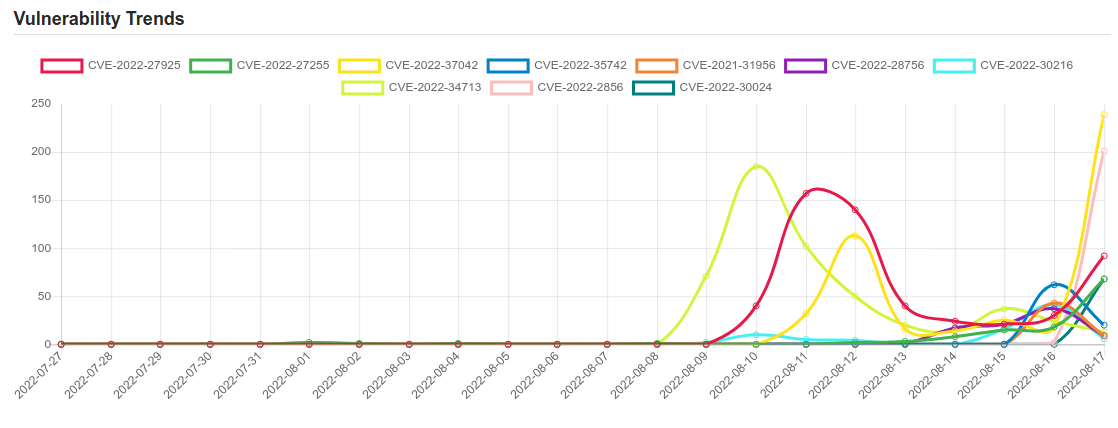Daily Vulnerability Trends: Thu Aug 18 2022

| CVE NAME | CVE Description |
| CVE-2022-37393 | Zimbra’s sudo configuration permits the zimbra user to execute the zmslapd binary as root with arbitrary parameters. As part of its intended functionality, zmslapd can load a user-defined configuration file, which includes plugins in the form of .so files, which also execute as root. |
| CVE-2022-2585 | No description provided |
| CVE-2021-30873 | A logic issue was addressed with improved state management. This issue is fixed in macOS Monterey 12.0.1. A malicious application may be able to elevate privileges. |
| CVE-2022-31793 | do_request in request.c in muhttpd before 1.1.7 allows remote attackers to read arbitrary files by constructing a URL with a single character before a desired path on the filesystem. This occurs because the code skips over the first character when serving files. Arris NVG443, NVG599, NVG589, and NVG510 devices and Arris-derived BGW210 and BGW320 devices are affected. |
| CVE-2022-2414 | Access to external entities when parsing XML documents can lead to XML external entity (XXE) attacks. This flaw allows a remote attacker to potentially retrieve the content of arbitrary files by sending specially crafted HTTP requests. |
| CVE-2021-1585 | A vulnerability in the Cisco Adaptive Security Device Manager (ASDM) Launcher could allow an unauthenticated, remote attacker to execute arbitrary code on a user’s operating system. This vulnerability is due to a lack of proper signature verification for specific code exchanged between the ASDM and the Launcher. An attacker could exploit this vulnerability by leveraging a man-in-the-middle position on the network to intercept the traffic between the Launcher and the ASDM and then inject arbitrary code. A successful exploit could allow the attacker to execute arbitrary code on the user’s operating system with the level of privileges assigned to the ASDM Launcher. A successful exploit may require the attacker to perform a social engineering attack to persuade the user to initiate communication from the Launcher to the ASDM. |
| CVE-2022-22630 | No description provided |
| CVE-2022-32893 | No description provided |
| CVE-2021-30659 | A validation issue was addressed with improved logic. This issue is fixed in iOS 14.5 and iPadOS 14.5, watchOS 7.4, macOS Big Sur 11.3. A malicious application may be able to leak sensitive user information. |
| CVE-2022-32894 | No description provided |
| CVE-2022-27925 | Zimbra Collaboration (aka ZCS) 8.8.15 and 9.0 has mboximport functionality that receives a ZIP archive and extracts files from it. An authenticated user with administrator rights has the ability to upload arbitrary files to the system, leading to directory traversal. |
| CVE-2022-27255 | In Realtek eCos RSDK 1.5.7p1 and MSDK 4.9.4p1, the SIP ALG function that rewrites SDP data has a stack-based buffer overflow. This allows an attacker to remotely execute code without authentication via a crafted SIP packet that contains malicious SDP data. |
| CVE-2022-37042 | Zimbra Collaboration Suite (ZCS) 8.8.15 and 9.0 has mboximport functionality that receives a ZIP archive and extracts files from it. By bypassing authentication (i.e., not having an authtoken), an attacker can upload arbitrary files to the system, leading to directory traversal and remote code execution. NOTE: this issue exists because of an incomplete fix for CVE-2022-27925. |
| CVE-2022-35742 | No description provided |
| CVE-2021-31956 | Windows NTFS Elevation of Privilege Vulnerability |
| CVE-2022-28756 | The Zoom Client for Meetings for macOS (Standard and for IT Admin) starting with version 5.7.3 and before 5.11.5 contains a vulnerability in the auto update process. A local low-privileged user could exploit this vulnerability to escalate their privileges to root. |
| CVE-2022-30216 | Windows Server Service Tampering Vulnerability. |
| CVE-2022-34713 | Microsoft Windows Support Diagnostic Tool (MSDT) Remote Code Execution Vulnerability. This CVE ID is unique from CVE-2022-35743. |
| CVE-2022-2856 | No description provided |
| CVE-2022-30024 | A buffer overflow in the httpd daemon on TP-Link TL-WR841N V12 (firmware version 3.16.9) devices allows an authenticated remote attacker to execute arbitrary code via a GET request to the page for the System Tools of the Wi-Fi network. This affects TL-WR841 V12 TL-WR841N(EU)_V12_160624 and TL-WR841 V11 TL-WR841N(EU)_V11_160325 , TL-WR841N_V11_150616 and TL-WR841 V10 TL-WR841N_V10_150310 are also affected. |
A considerable amount of time and effort goes into maintaining this website, creating backend automation and creating new features and content for you to make actionable intelligence decisions. Everyone that supports the site helps enable new functionality.
If you like the site, please support us on Patreon using the button below

To keep up to date follow us on the below channels.




![Cobalt Strike Beacon Detected - 175[.]24[.]227[.]106:443 6 Cobalt-Strike](https://www.redpacketsecurity.com/wp-content/uploads/2021/11/Cobalt-Strike-300x201.jpg)